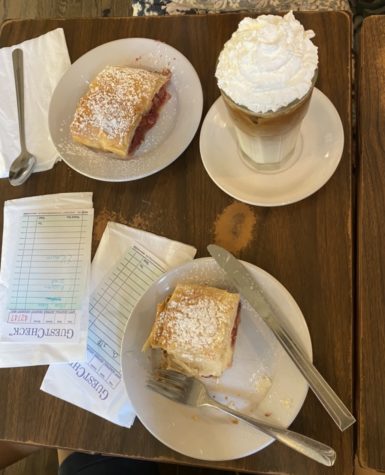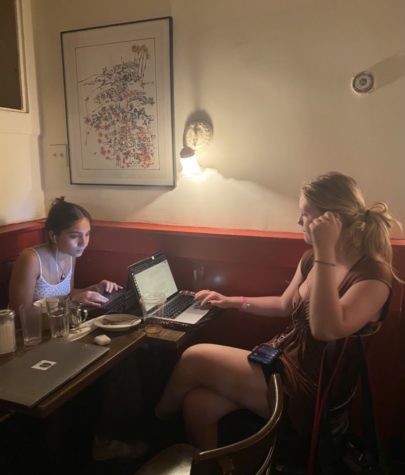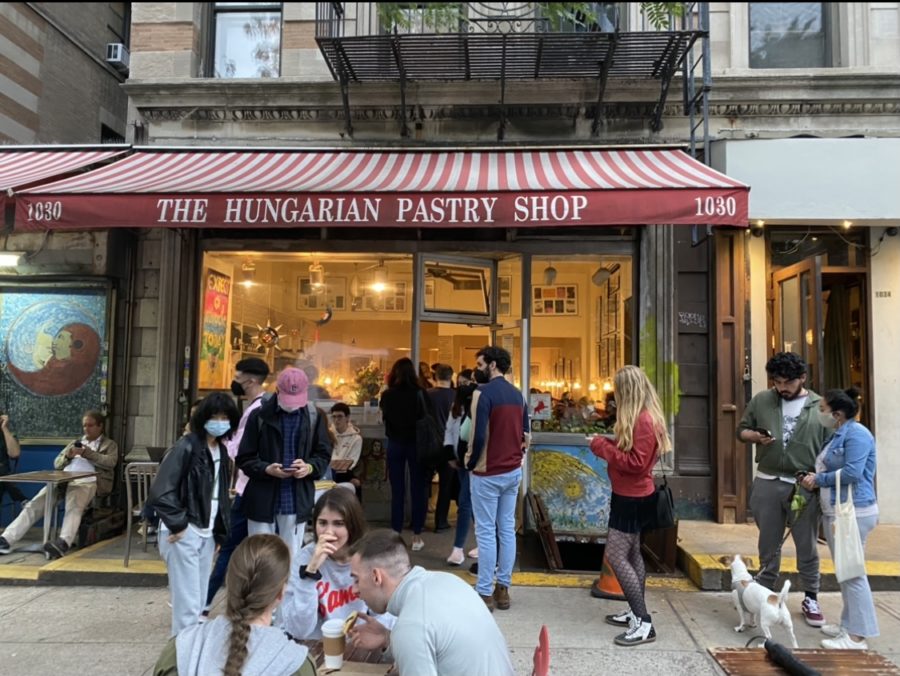A Brief History of the Hungarian Pastry Shop
Students, foodies, and creative minds have found solace at the Hungarian Pastry Shop since the 1960s.
The line outside of the Hungarian Pastry Shop spans to the end of the block (on a slow day).
In New York City, the 1960s was an age of new beginnings. Immigration brought waves of new city-dwellers, an ongoing fight for societal change brought protesters onto the streets, and technological innovations landed a man on the moon.
Arguably the most delicious new beginning of the 1960’s took place in Morningside Heights: the opening of the Hungarian Pastry Shop.
Nestled between Columbia University and Morningside Park, the Hungarian Pastry shop was founded by a Hungarian-Jewish immigrant couple in 1961. It began as a small home-style cafe, with a kitchen and a dining counter. The shop was bought only 15 years later in 1976 by another couple, Peter and Wendy Binioris, and it has thrived under their ownership.
The shop has stayed constant as the neighborhood around it changes, facing a process of gentrification, primarily spurred by the presence of Columbia University. The family-owned small business is a rare find amidst the corporate chain restaurants that have arrived over the years. Because of its authentic 1960’s feel, the shop continues to be a local favorite under the ownership of the couple’s son, Philip Binioris.

The Hungarian Pastry Shop’s warm lighting, flaky European pastries, and friendly employees attract long lines of customers, particularly students and locals. Many use the cozy dining area as a space for creativity and literary stimulation – I often visit the Hungarian Pastry Shop when I need a productive space to write, occupying a table against the back wall with a cookie and a cup of coffee. I’ve found myself writing journalism articles for The Science Survey, short stories, and diary entries at these tables.
The shop has a history of being home to writers, some even writing entire books under the spell of the hamentashens, carrot cake, and Hungarian coffee. In 2015, Ta-Nehisi Coates wrote his bestselling novel Between the World and Me in the shop. Julie Otsuka found inspiration at the table across from his, and wrote her historical fiction novel When the Emperor Was Divine.
A fellow regular once told me that he uses the space as his office, coming to the shop daily and writing short plays and movie scripts until closing. I often see him sipping a cup of coffee, with his table covered in stacks of paper and open books.

But the shop isn’t just for the literary inclined. Philip Binioris made this clear, stating, “We don’t single people out…You don’t have to be writing a book to come here.” Anyone is welcome to enjoy the pastries and warm atmosphere of the Hungarian Pastry Shop – it just happens to be a place that many have found to inspire their creativity.
In fact, Binioris described an ideal crowd as “anybody who likes a good pastry,” “nice people,” and “those who can handle waiting in a line.” As the owner of a small business, he appreciates all visitors, and he has taken pleasure in building close relationships with his repeat customers.
When I visit the Hungarian Pastry Shop, I overhear customers conversing about their dating lives on the Columbia campus, typing away on their laptops, and drooling over the Russian coffee (a personal favorite menu item of mine). It is this mixture of silent workers and lively conversationalists that truly brings the space to life, and what makes it such a special place.
“We don’t single people out…You don’t have to be writing a book to come here,” said Philip Binioris, owner of The Hungarian Pastry Shop.
Ellora Klein is a Copy Chief for ‘The Science Survey.' She enjoys exploring different perspectives through writing, editing, and reading. Ellora chose...

